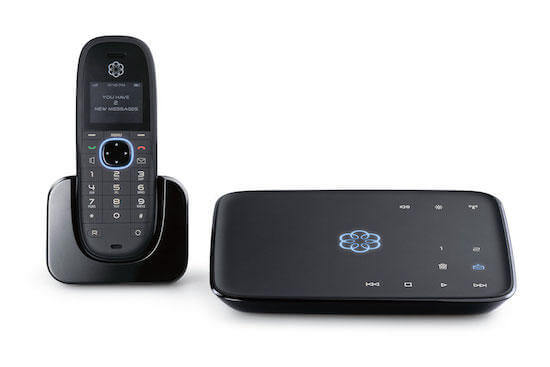
The Ooma Telo uses your Internet connection to provide telephone services. You can buy the device once for $129.99 and use it forever. This sounds a lot like the Vonage pitch from a few years back, but with a crucial difference. The Ooma sounds great, way better than the other VOIP (voice over Internet Protocol) services on the market. If you're tired of paying your local phone company for a land line, this is a great solution if you know exactly what you're getting into.
Anyone under the age of 30 whose first phone was a cell phone may not really see the need for a home phone number, but people alive back in the ancient times of the '70s and '80s often feel like a shared family phone is a necessary part of a civilized lifestyle. Ooma wants to talk to you people.

The Telo plugs into your home Internet modem or wired network and that's pretty much it. You can get a new number for free. If you want to port over your existing number, it'll cost you $39.99, most of which probably gets turned over to your current provider in exchange for them giving up the number.
You can also use any corded or wireless handset you like with the Telo, but Ooma makes a really outstanding handset that you can buy as part of a bundle with your Telo or separately for around $59.99.

So, what do you get with your free lifetime phone service after you buy the $129.99 device (and maybe spend an extra $100 if you port your number and get a handset)? Well, there's a small and unavoidable catch. Even after you drop your home carrier, you have to pay state and local phone taxes to have that number associated with your address, which is necessary if you want to use the 911 service in an emergency. If you don't have your location registered, you might as well be using Skype or FaceTime for your phone calls. Taxes where I live are around $3/month. Definitely worth it and it's supporting a government service worth paying for.
Here's what comes with the basic free service: free USA calling, remote voicemail access from any phone or web browser, caller ID, call waiting, an online call log and low-cost international calling starting at 1.4¢ per minute. Most of this is handled through an easy-to-use web interface and these services are going to be more than good enough for most customers.
Gadgetheads and people with complicated lives will want to look at Ooma's premier service. For $9.99/month, you get unlimited calls to Canada, three-way calling, the caller ID adds the name of the party calling you if it's available and a do not disturb feature that lets you temporarily send your calls to voicemail. You can also get your audio voice mails automatically emailed to you and set up Ooma to send you a text message whenever you have a new voicemail. You can blacklist callers you don't like and send their calls directly to voicemail and also block anonymous callers: if those people want to reach you, they have to reveal their caller ID. There's also a one-touch option to send callers to voicemail.
Finally, there's an option to reroute your calls to a backup number if your Internet goes down. You were waiting for the catch? Our survivalist readers have been waiting to see if the truth would be revealed. You old landline draws its power from the physical phone lines and there's a good chance your phone will stay online after a natural disaster. With Ooma (and every other VOIP service), loss of power and/or Internet service means loss of phone service.
That's a pretty compelling argument for paying the $10/month but, at that point, you've traded a boring land line for something with a lot of advanced features for pretty much the same price per month.
Oh, there's one more thing: for $4.99/month, you can get your voicemails transcribed and emailed to you.
Friends and family who use Ooma rave about the call blocking and blacklist features. They claim it's the cure for unwanted telemarketers. A few friends with family living overseas have recommended Ooma for their rates and call quality, which seems to be more reliable than Skype.
This is a great device if you're looking for the features it offers. Check it out with some senior citizens. The technologically inclined know all about Ooma and they'd love to tell you about it.




